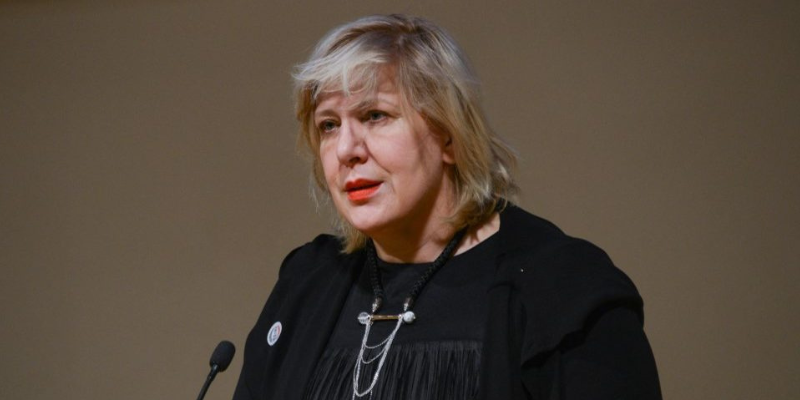“All who are committed to democracy and a free press have a duty to do everything in their power to turn the tide,” the Council of Europe Commissioner for human rights Dunja Mijatović said during a European Parliament seminar on media freedom organised for the Daphne Caruana Galizia Prize 2022.
“In my work as Council of Europe Commissioner for Human Rights, and previously as OSCE Representative on Freedom of the Media, I have witnessed first-hand how journalists and other media actors are threatened across Europe and beyond our continent.”
The case law of the European Court of Human Rights grants the broadest scope of protection to individual journalists and the press. “But reality speaks of another truth… an average of one journalist is killed every two months on European soil. The picture at a global level is even more horrific.”
While some were killed covering conflicts, others were killed because they were trying to bring criminal activities under public scrutiny. “Just like Daphne,” Mijatović said.
She stressed that murders of journalists are the most visible part of “an iceberg of risks” that journalists face. They face imprisonment, legal and financial harassment, gender violence and online threats.
“Media themselves struggle to survive. Other instances of physical violence remain a widespread threat. As if that were not enough, detention, judicial harassment, intimidations and pressure on sources also oppress journalism in many European countries. This is further compounded by the fact that investigations into murders and crimes against journalists often drag on for years and produce mixed or no results at all,” the Commissioner said.
She added: “A climate of impunity inflicts additional pain on journalists and their families, shields perpetrators from accountability, and facilitates further attacks against the profession. It also violates well-established human rights obligations that require states to protect journalists’ lives.
In cases where they fail to uphold this obligation, they still have the duty to carry out prompt, independent and effective investigations – which should be open to public scrutiny and accessible to the victims’ families – aimed at punishing the hitmen and the masterminds of the killings.
“The recent 40-year sentence imposed on the hitmen responsible for Daphne’s murder is a step forward in the long fight for justice. But it is not enough. Now it is necessary to punish the masterminds of this abject crime and shed full light on the motives and institutional responsibility which made it possible,” the Commissioner said.
She referred to the Caruana Galizia family, who she said has been the driving force to ensure that this cold-blooded murder is fully investigated. “While the work of Matthew, Paul and Andrew Caruana Galizia has been remarkable, seeking justice should not be the responsibility of a grieving family. It is the responsibility of states and their institutions, and all of us, to ensure that there is no impunity.”
Her message was that all who are committed to democracy and a free press have a duty to do everything in their power to turn this tide. “The institutions we work for and represent have a legal responsibility to protect the free press. We have to join forces to keep threats to journalists under the spotlight and keep pressure on authorities to ensure protection, end impunity and improve legislation to safeguard media freedom.”
She called for stronger action to counter hostility against journalists and to remedy the structural deficiencies in state institutions that should protect them.
The Commissioner said four key fields of action seem to be crucial. States must end impunity for crimes against journalists, we must demand more action to implement existing standards, in particular the case law of the European Court of Human Rights, the Council of Europe Recommendation on the protection of journalism and the safety of journalists and other media actors and the EU Recommendation on SLAPPs.
#SLAPPs are the 2nd most dangerous threat to #FreedomOfExpression.@coe states must prevent the abuse of the justice system to suppress public participation and #StopSLAPPs.
👉https://t.co/pdq0teBxMW#AntiSLAPPcon pic.twitter.com/NEe7Xt1gWj
— Commissioner for Human Rights (@CommissionerHR) October 20, 2022
“The Council of Europe is also preparing a Recommendation to address the problem of SLAPPs. These complementary standards can be instrumental in better protecting journalists from the abusive use of the justice system.”
She also called for change in the political discourse regarding the press. “As I have often stressed, political leaders, opinion makers and influencers must avoid hostile speech and actions against journalists and must condemn all attacks, physical and verbal, against them. They should protect, not hamper the work of journalists.”
The fourth area concerns the support provided to initiatives aimed at protecting journalists. “I refer here in particular to police protection systems, initiatives providing psychological support to journalists and their families victims of attacks, as well as to national and international monitoring and reporting on media freedom and threats against journalists.”
Better support should be offered for these initiatives to share them and help them interact with similar realities in other countries and internationally, and reinforce the ability to react to threats to media freedom in a timely manner.
She stressed: “All these measures are within reach if there is political will. While it will probably be impossible to prevent all dangers that journalists may face in their work, states have the legal, financial and political means to reinforce the safety of journalists.”
The winner of the Daphne Caruana Galizia Prize 2022 are two journalists, Clément Di Roma and Carol Valade, for their documentary ‘The Central African Republic under Russian influence’.














https://www.youtube.com/watch?v=1UPNhJKJgQI&t=141s